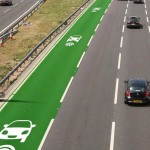 Whilst there has been a great deal written about the increasing smartness of cars, whether it’s in avoiding potholes or completely driving themselves, much less attention has been given to the actual roads themselves.
Whilst there has been a great deal written about the increasing smartness of cars, whether it’s in avoiding potholes or completely driving themselves, much less attention has been given to the actual roads themselves.
A recent UK government project is doing some fascinating work in this regard however that should perhaps prompt us to change that perspective. The Highways England department is doing some clever things with road technology that could remove the need for electric vehicles to stop to recharge.
Smart roads
The trials, which are believed to be the first of their kind, will test the safety and practicality of turning the road itself into a means by which to charge the battery of an EV.
The initial trial follows a successful feasibility study into the wireless power transfer technology that sits at the heart of the project.
“The potential to recharge low emission vehicles on the move offers exciting possibilities. The government is already committing £500 million over the next five years to keep Britain at the forefront of this technology, which will help boost jobs and growth in the sector. As this study shows, we continue to explore options on how to improve journeys and make low-emission vehicles accessible to families and businesses,” the department say.
The trials hope to commence later this year and will see vehicles fitted with wireless technology that will communicate with equipment installed underneath the road in a bid to replicate motorway conditions.
Further details about the trial are due to be published once a contractor has been found to fulfill the trial, with the whole process expected to take around 18 months – 2 years.
It’s a fascinating project and one that echoes a similar venture undertaken in South Korea a few years ago that attempted to wirelessly charge the batteries in an electric bus.
Clever stuff. Road pricing is not far away I suspect.
Very clever I must say, but I wonder if it provides more energy than the current braking method used in hybrid cars? I guess it'd be useful for motorway style driving when braking isn't done very often.
I'd imagine that's exactly where it will be used, yes 🙂
It's probably only economical in closed systems like airports or tourism resorts.
There is nothing that dictates that this has to be deployed to every road. Done right, it would be sections of long-haul highways that receive drive over charging capabilities. Say for example freeways have chargers installed every 20 miles in the rightmost lane only. This could fill the gap where batteries don't have the range to allow for driving long distances. Charging could be billed automatically like toll booths today and drivers would chose to charge while driving when their trip exceeds the capacity of on board batteries.
It's not economical for large scale applications, as long as electricity is not super cheap, which it is not as of now, because it has environmental cost.
Metro could use wireless charging, because Metro has high traffic, roads have less people per day.
When the Metro starts using wireless charging, then we might start thinking about roads.